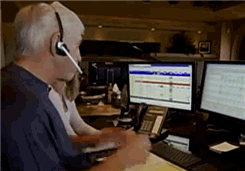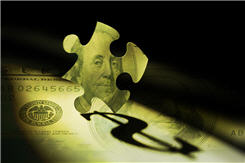 All Entries in the "Trading Psychology" Category
All Entries in the "Trading Psychology" Category
Choose Your Discomfort
May 19, 2011 at 9:52 am
 Trading is not easy.
Trading is not easy.
There…I said it. As if you didn’t already know.
It can be simple, but that’s different. When you’re trading well, it might feel easy, but when the tough stretches arrive again (and they will), you’ll be reminded that it’s hard. As they say, “if it were easy…”
Contrary to what most traders think, the hard part of trading isn’t being right or wrong. Each of us will find ourselves in winning trades and losing trades at times – even random entries can produce (at least temporary) profits. Discomfort is the hard part.
Discomfort in trading can be tied to either profits or losses.
For example…
Our minds seem hardwired to shun (perceived) failure, so some traders struggle in a big way to close out a losing position and instead spend waste time hoping for a turnaround which may or may not ever happen. It’s uncomfortable for them to admit defeat and accept a small loss, so they usually pay big to try and avoid that.
Our minds can also have recency bias, so after a string of losses, it’s tempting to book a winner – no matter how small – just to stop the bleeding and have a taste of success again. It can be uncomfortable to let open profits ride when you’re clearly on the correct side of a trade – what if you give them back?! You need this winner, right? That often leads to booking smaller gains as compared to what you were on track to get paid, and that adds up big over the course of your month, or your year, or your career.
Discomfort can also be tied to our preferred trading timeframe.
Some can’t stand the erratic price action found on the intraday charts, and they tend to respond with late or forced entries when day trading. They get spooked out of good trades, opting instead to focus on the most recent 5-minute bar rather than the overall direction that’s taking place.
Others can’t stand to give a stock an appropriate amount of wiggle room when swing trading, so they choke off what would be a good trade in favor of a stop that’s too tight. Instead of positioning themselves smaller in order to weather the short-term shake-outs, they essentially overtrade by reacting to insignificant moves within the context of a bigger trend. Profits aren’t allowed to pile up, and their skittish approach keeps them frustrated by the big moves they were once a part of but missed out on.
Here’s my point:
Risk involves discomfort, so if you’re constantly avoiding discomfort, you’re avoiding risk – and by definition, risk must be taken in order to profit in the markets. The key is to manage that risk appropriately, which also means managing your discomfort appropriately.
There’s no getting around discomfort in trading. Everyone has it, regardless of directional bias or timeframe preference or the market being traded.
Either you’re uncomfortable with the results you’re getting (e.g. overtrading, not sticking with good trades, staying too long in poor trades), or you’re going to face some discomfort while denying yourself as you stay with a good position. That’s going to include enduring pullbacks, watching some profits evaporate, and being patient while waiting for an acceleration move to occur.
In an instant-gratification society like ours, it’s no wonder most traders fail. Have the courage to choose your discomfort ahead of time, so that by expecting it and mentally rehearsing what you’ll likely face, you’ll in turn be able to respond with good decisions.
Trade Like a Bandit!
Jeff White
Producer of The Bandit Broadcast
Are you following me on Twitter yet?
Consistency Over Time
March 30, 2011 at 1:19 pm
 It’s been said that good trading is a marathon – not a sprint. I’ve said it too, because I agree. Overnight riches come to very few, but the truly successful usually earn it over time.
It’s been said that good trading is a marathon – not a sprint. I’ve said it too, because I agree. Overnight riches come to very few, but the truly successful usually earn it over time.
Think about it…it takes some time to learn this game, to get comfortable, to evolve to where you’re agile enough and have the discernment to switch styles or approaches when the situation calls for it. A newbie only does that out of desperation. In this game, experience pays.
Truth be told, March has been a tough month for me. I’ve been whipped out of some trades, bought some highs and sold some lows. Naturally, it has elevated my frustration level. The good news is that I’ve been here before. I’ve had those months where I have struggled, and every time I’ve been able to battle back – thankfully. This time should be no different.
I’ve looked over some trading results today, and it was a good exercise. I was reminded that there are occasional stretches where I give some back to the market. But they’re just little phases, and they’re inevitably followed by good runs – so long as I keep after it. I don’t have to make huge bets and get it all back in one trade, and I also don’t have to force trades in order to see my account back at highs. I simply need to keep a level head and persist.
Ask any distance runner, and they’ll tell you it’s all about maintaining a steady pace. The hills hurt, like losing trades, but you maintain your tempo and push through it. Cadence is important to cyclists, so they shift gears along the way in order to maintain that rhythm.
Similarly, you and I size up when we’re in the groove, just a runner takes longer strides going downhill or a cyclist shifts to high gear. When the road gets rougher or tougher on us, we scale back our size but we keep taking One Good Trade – that’s our job.
Trading at times feels like a fun run…achievement comes easy and you get the t-shirt as a bonus! At other times, it feels like an ultramarathon for which you aren’t prepared. Fortunately, we have the chance to rest along the way, and improve as we go. Attitude is key, as is taking a long-haul approach with our career as traders – even if we love short-term charts!
How are you running your race?
Trade Like a Bandit!
Jeff White
Producer of The Bandit Broadcast
Are you following me on Twitter yet?
Walking Away
March 3, 2011 at 3:31 pm
I caught Joey Fundora’s post today called It’s Okay to Take a Break From Trading. He brings forth some excellent points, so go check it out. And while Joey primarily addresses backing away when you feel you lack an edge (rightfully so) or when going on vacation, it got me thinking about the times when trading just becomes a little too important, and perhaps even a self-imposed staycation might be warranted.
When the Scales Are Tipping…
 Trading is one of those activities that can put you on top of the world, or completely bury you – if you allow it. And by “if you allow it,” I’m not referring to making or losing money. After all, every one of us will have some good trades and some bad trades – that’s not what I’m talking about. I’m talking about allowing trading to be the all-important activity in your life. If it’s sitting on that throne for you, then unfortunately, your daily satisfaction will hinge upon the color of your P&L.
Trading is one of those activities that can put you on top of the world, or completely bury you – if you allow it. And by “if you allow it,” I’m not referring to making or losing money. After all, every one of us will have some good trades and some bad trades – that’s not what I’m talking about. I’m talking about allowing trading to be the all-important activity in your life. If it’s sitting on that throne for you, then unfortunately, your daily satisfaction will hinge upon the color of your P&L.
That’s a really tough spot to be in. It magnifies your mood swings from day to day, and honestly, it’s not healthy. It’s no fun either. If you’re driven (as I am), the up day’s don’t carry near the weight in satisfaction as the down days tend to carry in dissatisfaction – regardless of if you’re making more than you’re losing. (Go back and re-read that sentence, because it’s a little confusing if you breeze through, but it’s of utmost importance.)
Stated otherwise, if I’m making good money on my up days and giving back only a portion of it on my down days, I’m net positive. But if I’m allowing my personal happiness to be based upon my performance today (or yesterday or tomorrow), I’m in for a world of hurt. I’m experienced, and I’ve been at this since the 90’s, so I have high expectations. Taking the aforementioned personal-satisfaction-based-upon-P&L approach, when I make money, I’m pleased but I expect to. When I lose money, I’m upset and the mood pendulum swings too far in a detrimental direction.
That’s a mistake which every one of us will at times make – but do not let it become a habit.
Work Hard & Let Go
Trading is hard. Really, truly difficult. Getting paid from your positioning takes real skill and experience, and that means you have to apply yourself to acquire those things. You don’t acquire them without true desire and hard work, which means you’re invested…with your time, your money, and often times your esteem on the line.
Just this week I had a day where I hit my peak of frustration. I didn’t smash any keyboards or scream at my computer or kick the dog, but I was running hot – and I hated it. I carried it with me, and later realized I’m giving trading too much weight. Yes, trading is what I do, and yes I have as strong of a desire to be successful at it as anyone else, but when I let a bad day bring me down the way I did, I’m giving it too much weight. Trading’s an activity, it’s not who I am. I have far too many other blessings in my life to place trading above them, but sometimes I need a reminder.
Maybe you need that reminder today as well – and here you go! Work hard with your trading, aim high, but keep it in its rightful place. As my buddy Bella says, Move On After a Trading Session. If you’re struggling to do that regularly, just walk away until you’re ready to return with a clear head and the proper perspective.
Trade Like a Bandit!
Jeff White
Producer of The Bandit Broadcast
Are you following me on Twitter yet?
Lessons From a Life-Long Speculator
January 26, 2011 at 11:43 am
 I caught a clip from a recent 60 Minutes interview in which a Las Vegas gambler named Billy Walters was profiled. This is a man who, at 64 years old, understands risk and edge as well as anyone. As a result, he’s been dubbed “the most dangerous man” by Vegas sports books.
I caught a clip from a recent 60 Minutes interview in which a Las Vegas gambler named Billy Walters was profiled. This is a man who, at 64 years old, understands risk and edge as well as anyone. As a result, he’s been dubbed “the most dangerous man” by Vegas sports books.
Walters has been a life-long speculator, betting on golf courses and in pool halls, and of course he wagers regularly on football and basketball games. He’s no stranger to streaks, having mentioned he’s been broke more times than he can recall, and yet the show stated he’s currently worth “hundreds of millions.”
The interview is embedded below, and you’ve got to see it, but before we get there I just want to point out a few things Walters clearly does exceptionally well. As traders, and therefore speculators in a different realm, we can all learn from him.
Success isn’t about making one big bet. Note in the clip below how Walters never lets it all ride on one game, instead he spreads out his capital across multiple opportunities. He’s confident in the outcomes, but by operating in different games and even different sports, he also helps to protect his outlay from unforeseen events. For the trader: don’t put your entire account into one idea.
Success goes hand in hand with passion. Walters’ net worth is said to be in the hundreds of millions, so why does the show depict him placing more bets of a few hundred thousand or mention he’s up $1M that week on his games? Because he’s passionate about it, he loves it. For the trader: if you don’t love the game, it’s going to be hard to get through the tough times and persist.
Get bigger when you have an edge. Over the years, Walters has increased his bets along with the expansion of his bankroll. But beyond that, when Walters sees a line that’s vastly different from his own, he bets very aggressively. He trusts his edge, and looks to exploit it most when that edge is biggest. For the trader: when your home-run setups come along with defined risk, size up.
Be creative. Walters used to be small enough he didn’t move the lines in the sports book when he placed his bets, but over time, he’s become a major player. That’s required him to adjust his system along the way, utilizing his team of associates to place bets for him. He also may push a line one way, then bet big on the other side. For the trader: don’t get stuck trading only one way, keep looking for a better approach.
Be persistent. A guy who claims he’s been broke many times clearly exemplifies persistence to not only still be in the game, but to be such a huge success. When the proverbial (or literal, in his case) chips were down, Billy Walters hung in there and kept fighting. He expected success, and he kept working until he got it. For the trader: stay in the game and don’t give up.
Surround yourself with sharper minds. Walters admits his team is made up of people who are all smarter than he is. That doesn’t mean he isn’t confident, but rather that he relies on others to provide assistance where he feels his skills are lacking. He’s no doubt the biggest success among them, but he attributes that to the bright people on his team. For the trader: if you’re not getting where you want to be on your own, get some help.
Play for meaningful stakes. One doesn’t amass a fortune by accident, and Walters hasn’t gotten rich by nickel-and-diming it along the way. He recognizes an opportunity, gauges the size of his edge, and then puts his capital at risk in expectation of a sizeable payout. For the trader: once you understand how to trade, allocate capital in such a way that you stand to make a fair amount when you’re correct – and never overtrade.
Here’s the clip:
Trade Like a Bandit!
Jeff White
Producer of The Bandit Broadcast
Are you following me on Twitter yet?
When Goals Impede Progress
December 30, 2010 at 11:10 am
Like it or not, it’s that time of year where goals enter the picture again. This is of course a time for family, gifts and bowl games, but it’s also a time when each of us are compelled to take a look back and a look forward.
Reaching the finish line at the end of the year leads us to consider how things went, and most all of us know whether we exceeded or fell short of the goals we set a year ago. In turn, we evaluate where we are and take a good hard look at where we want to be a year from now.
Goals have some excellent qualities and they serve a real purpose when used correctly. They can make us think bigger and cause us to grow. They can drive us to consistently work toward an objective, helping to bring purpose to our daily activities. And goals can boost our confidence when we achieve them, helping us to realize that we’re capable of striving for higher levels. Goals are great, and I’m a goal-setter. I’ve discussed goals here numerous times over the years, but there’s one take on goals I’ve never before mentioned…
 Goals aren’t always good, and they can actually hold us back when they’re set in the wrong manner or approached in the wrong way.
Goals aren’t always good, and they can actually hold us back when they’re set in the wrong manner or approached in the wrong way.
What Bad ‘Goals’ Look Like
As an example, years ago I would periodically update the wallpaper on my PC’s desktop with a new dream car that I’d want to go after with my trading profits. Inevitably, my trading would go almost instantly in the toilet! The new ‘goal’ was a distraction to me from what I should have had my focus on, which was the market action…not something I wanted to buy with my trading profits. (Realizing this, I’ve since kept pictures of my family as my desktop wallpaper!) My goals now involve processes I need to go through for good trading, rather than cars or destinations (duh). First things first!
3 Ways Goals Can Stunt Growth:
1. If goals are too high, we sometimes force trades in an effort to reach them. Lofty goals are good, but they can’t lead you to take on outsized risks or overstep your bounds in terms of risk. Set goals that will require growth on your part and get you outside your comfort zone, but which are still attainable for your style of trading, account size, and risk tolerance.
2. If goals aren’t practical, we may prematurely dismiss hope for achieving them. I’m not referring to quitting, I’m talking about not pushing oneself the right way. Suppose you have a profit goal for the month and you’re down to the final week and miles away from your goal. It’s easy to dismiss that goal and wait for the next month to come around, yet there’s opportunity you’d be missing out on now if you did that. Grow your account every chance possible, even if you’re lagging on a goal.
3. If goals are distracting, they don’t help us. Like the car example above, my ‘goal’ was merely an aspiration and therefore not something that directed the focus of my trading. Instead, it detracted from it, and took me farther from where I’d have been without it. Make your goals process-oriented, and the results will take care of themselves.
Trade Like a Bandit!
Jeff White
Producer of The Bandit Broadcast
Are you following me on Twitter yet?
Trade Like You Don’t Need the Money
December 3, 2010 at 8:07 am
 The post title says a lot, and we could probably all tape the phrase to our monitors and come away better traders.
The post title says a lot, and we could probably all tape the phrase to our monitors and come away better traders.
But let’s spend a few minutes digging a little deeper to find what it would mean to “trade like you don’t need the money.” What does that look like? What are the advantages and disadvantages of approaching your trading with this mentality?
Let’s start off by looking at some examples of people who have experienced massive success in their respective fields. That isn’t by accident, and they sure didn’t quit once they got “rich.”
Professional athletes in general make a lot of money. Many of them spend more than they make, so we’ll discard those for the sake of this discussion. There are a few superstars in every sport though, and with the global coverage most sports tend to get, they’re household names. Kobe Bryant, Derek Jeter, Peyton Manning, Tiger Woods, Roger Federer, and the list goes on. Having an 8- or 9-figure net worth is not what drives them…it’s greatness. They find fulfillment in preparing and performing in such a way that they’re the best.
There are musicians who have had the same kind of success. One of the most popular bands in the world is U2, and they had “arrived” many years ago in terms of popularity and revenue from album sales and concerts. But they kept going, kept evolving, and kept on succeeding. It’s not the money that pushes them, or else they’d have walked away long ago.
Think Record Books, Not Scoreboard
As traders, it’s so easy to become motivated by the money. Our P&L is the scoreboard that’s always right in front of us…during the day, and once the closing bell rings. We know where we stand at any moment, and that’s actually more of a hindrance to many than it is a help.
Some platforms allow you to hide profit & loss numbers, and that’s a band-aid solution which some choose to do in order to focus better on the price action and less on profits. But rather than try to treat the symptoms, why not go right to the source of the problem – your mindset.
To trade like you don’t need the money, your goals and passion have to be centered on something much bigger than money…and bigger than what that money can buy you. Your satisfaction from trading needs to be rooted in the process of attaining success.
That means you care about digging for great ideas more than booking a $1500 winner. You know if you do the former well, the latter will take care of itself.
It means you love turning off your screens at the end of the day knowing you followed your rules with discipline.
It means your undivided attention is on the market when it’s time to trade, and distractions aren’t allowed to interfere.
It means you’ll spend time doing things others won’t, like watching trading film (hat tip to @smbcapital) in order to recognize your mistakes as well as reinforce and mentally rehearse your strengths.
It means you follow other traders’ blogs and StockTwits streams only when their ideas are suited to your trading style, and you avoid all else because it becomes noise.
And it means you fuel your competitive drive day in and day out to focus on winning and nothing else. That brings with it a host of other issues, like staying out late or treating your body well, because you care about peak performance.
Trading like you don’t need the money requires passion for what you’re doing that exceeds all hopes for monetary gain. It’s a mentality of maturity whereby you realize that truly great trading will provide you with all you need and then some, and once you’ve fully accepted that, you’re able to let go of the monetary concerns and completely center your efforts on improving your process.
Put your strengths to work today with total focus, and just see what happens. If you’ll do it for a week, then a month, and build on it each day, you’ll be implementing habits which deliver all kinds of ongoing success – including money.
** If you’ve got something else to add, please share it in the comments.
Trade Like a Bandit!
Jeff White
Producer of The Bandit Broadcast
Are you following me on Twitter yet?
5 Rookie Trader Mistakes & How to Avoid Them
October 4, 2010 at 8:50 am
 In trading, as in life, lessons can be learned out of inspiration or desperation. It’s hard to say which is better, but I know that regret is quite a teacher.
In trading, as in life, lessons can be learned out of inspiration or desperation. It’s hard to say which is better, but I know that regret is quite a teacher.
For example, I’m in the process of buying a house right now, which will be the second for my wife and me. Eight years ago, I made several mistakes as a first-time buyer, some of which I’ve wished I could go back and change. Experience educates each of us, fortunately, and needless to say this time around (I think) I’m doing it right.
A lack of experience is responsible for many mistakes newer traders make as well. Those errors not only prove costly the first time around, but they can also ingrain some bad habits if not corrected quickly.
Over the years, I’ve been fortunate to work with hundreds of traders around the globe, of all trading styles and timeframes. And yet as diverse as these traders seem to be, a handful of common issues continue to surface. Coincidence? No. Just human nature, which the market preys upon.
So, to help you stay on the right path with your trading, let’s take a look at 5 common mistakes rookie (or struggling) traders make, and how to avoid them.
1. Adding to Losing Positions. This is a biggie, and it addresses perhaps the most common lapses in judgment among traders of all experience levels. Gartman says to “do more of what is working, and less of what isn’t working.” By definition, a losing position is not working. And unless you originally planned to scale into the trade, adding to a loss is a big no-no. Take note of your P&L, and if you’re wrong, avoid throwing good money after bad.
2. Forcing Trades Out of Boredom. Boredom is one of the biggest enemies of today’s trader, because it leads to so many bad decisions (like overtrading). Transaction costs are so low and it’s so easy to place trades that one can easily forget just how costly boredom trades can become. So if you’ve done your homework and come up with very little, place no pressure on yourself to be active. There are times where sitting tight is exactly what you should be doing, so have the courage and discipline to do nothing when that’s the case.
3. Switching Strategies By the Day. I’m all for trading with multiple strategies, and as your experience increases, your trading toolbelt will begin to fill. However, each of us during times of struggle has encountered the losing streak. That’s perhaps the biggest cause for traders to throw the proverbial spaghetti at a wall to see what sticks. While experimenting can yield some clarity, doing it in either the wrong fashion or too frequently can prove counterproductive. Get some trader training, put some strategies to work across multiple timeframes, and give them enough time to prove their effectiveness. Trying something for a day, losing money with it, and shifting quickly to something else isn’t responsible, so avoid that limited mindset.
4. Putting Everything on the Line for one ‘Idea’ Trade. I was once warned by a more-experienced trader, “don’t get any ideas!” He was right. A longer-term thesis takes time to play out, so leave that to the fundamentalists who don’t mind tying up their capital for months on end – for better or for worse. Stick with what the price action is telling you, and determine the best opportunities to get on board for the next move. Ideas are only useful when they relate to technical discoveries, so don’t bank on guessing right for one big recovery play – it may instead prove to be the final nail in the coffin.
5. Hoping a Stock Will Recover. Each of us has been trapped by a bad trade, and we’ve wondered if sitting motionless and simply hoping to be let out of the trap is the best solution. Marty Schwartz, of Pit Bull fame, mentioned how as a soldier, he was trained to do something when under attack…either fight back or retreat, but don’t just sit there. Hope truly is a 4-letter word in the trading realm, and relying solely on hope will provide plenty of damage to your trading account. Stops are available for good reason. Game plans offer if/then scenarios to follow under the gun so that big decisions need not be made in times of stress or volatility.
Avoid making these mistakes, and your money will be much harder for the pro’s to take.
Trade Like a Bandit!
Jeff White
Producer of The Bandit Broadcast
Are you following me on Twitter yet?





